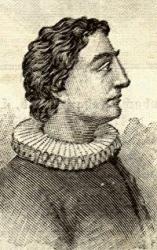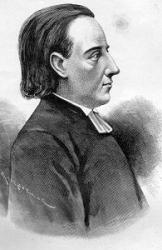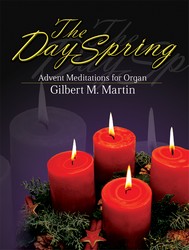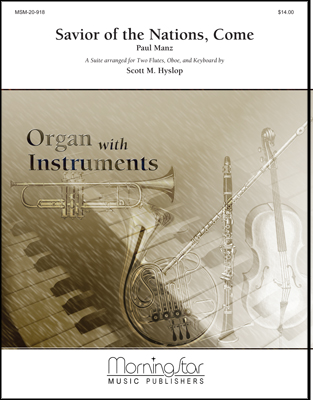Translator (into German): Martin Luther

Luther, Martin, born at Eisleben, Nov. 10, 1483; entered the University of Erfurt, 1501 (B.A. 1502, M.A.. 1503); became an Augustinian monk, 1505; ordained priest, 1507; appointed Professor at the University of Wittenberg, 1508, and in 1512 D.D.; published his 95 Theses, 1517; and burnt the Papal Bull which had condemned them, 1520; attended the Diet of Worms, 1521; translated the Bible into German, 1521-34; and died at Eisleben, Feb. 18, 1546. The details of his life and of his work as a reformer are accessible to English readers in a great variety of forms. Luther had a huge influence on German hymnody.
i. Hymn Books.
1. Ellich cristlich lider Lobgesang un Psalm. Wittenberg, 1524. [Hamburg Library.] This contains 8 German h…
Go to person page >Author: St. Ambrose

Ambrose (b. Treves, Germany, 340; d. Milan, Italy, 397), one of the great Latin church fathers, is remembered best for his preaching, his struggle against the Arian heresy, and his introduction of metrical and antiphonal singing into the Western church. Ambrose was trained in legal studies and distinguished himself in a civic career, becoming a consul in Northern Italy. When the bishop of Milan, an Arian, died in 374, the people demanded that Ambrose, who was not ordained or even baptized, become the bishop. He was promptly baptized and ordained, and he remained bishop of Milan until his death. Ambrose successfully resisted the Arian heresy and the attempts of the Roman emperors to dominate the church. His most famous convert and disciple w…
Go to person page >Translator (into Swedish): Olavus Petri

Olof Persson, sometimes Petersson (January 6, 1493 – April 19, 1552), better known under the Latin form of his name, Olaus Petri (or less commonly, Olavus Petri), was a clergyman, writer, judge and major contributor to the Protestant Reformation in Sweden.
See also in:
Wikipedia
Go to person page >Alterer: J. Åstöm

Åström, Johan. (Gaevle, Sweden, November 30, 1767--February 29, 1844). Lutheran. Ordained in 1793, he was briefly pastor of the German church in Norrkoeping, then appointed rector (1805) at Tuna and Stavby and (1821) at Sigtune and Altuna; assisted Archbishop J.O. Wallin in preparing the Psalmbok (1816-1818). The 1819 edition contained 11 of his hymns and several translations.
--Don Hustad, DNAH Archives
Go to person page >Alterer: Johan Olof Wallin

Johan Olaf Wallin was born at Stora Tuna, in 1779, and early displayed his poetical powers. In 1805, and again in 1809, he gained the chief prize for poetry at Upsala. In the latter year he became pastor at Solna; here his ability as a preacher was so striking that he was transferred to Stockholm, in 1815, as "pastor primarius," a title for which we have no exact equivalent. In 1818 he was made Dean of Westeras, and set about the task of editing a revised hymn-book for the whole of Sweden. This task he completed in 1819, and published it as, Den Swenska Psalmboken, af Konungen gillad och stadfästad (The Swedish hymn-book, approved and confirmed by the King). To it he contributed some 150 hymns of his own, besides translations and recasting…
Go to person page >

 My Starred Hymns
My Starred Hymns












